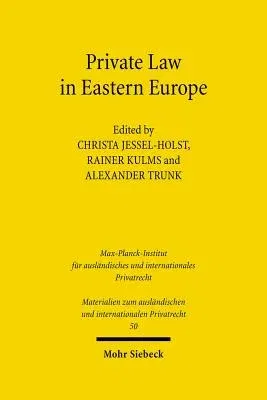More than 20 years have passed since the downfall of socialist systems.
To accelerate transformation processes utmost priority was given to the
recognition of property rights, an indispensable requirement for free
market economies. Regulators soon came to realize that the success of
transformation was conditioned on a more systematic approach towards
codified civil law and business law. Numerous comparative law studies on
individual Eastern European states have been undertaken, but they fail
to portray the dynamic in its full scope. Studies adopting long-term
perspectives and offering multi-nation comparisons are particularly
rare. In March 2009, a symposium was held at the Hamburg Max Planck
Institute for Comparative and International Law to address these
shortcomings. In this conference volume Christa Jessel-Holst, Rainer
Kulms, and Alexander Trunk assemble the contributions by international
policy advisors and scholars from Eastern and South Eastern Europe
(Bosnia and Herzegovina, Bulgaria, Croatia, Hungary, Poland, Romania,
Russia, Serbia, Slovenia and Ukraine) assessing codification processes
in classic civil law fields and company and capital market laws. In
spite of comparable transformation problems, the individual processes
are moving forward quite disparately, oscillating between 'old'
socialist codifications, legislative projects faithful to the acquis
communautaire and new codifications with a distinctly autonomous
approach. Nonetheless, most transformation states are united in their
effort to establish efficient court systems which can handle the acquis
without being positivistic.Contributors: Jurgen Basedow, Rainer Kulms,
Michel Nussbaumer, Frederique Dahan, Thomas Meyer, Alexander Komarov,
Volodymyr Kossak, Jelena Perovia?, Camelia Toader, Verica Trstenjak,
Christian Takoff, Tatjana Josipovia?, Meliha Povlakia?, Dusan Nikolia?,
Mirko Vasiljevia?, Alexandra Makovskaya, Oleg Zaitsev, Ionu? Radule?u,
Tania Bouzeva, Radu Catana?, Andras Kisfaludi, Krzysztof Oplustil,
Arkadiusz Radwa

